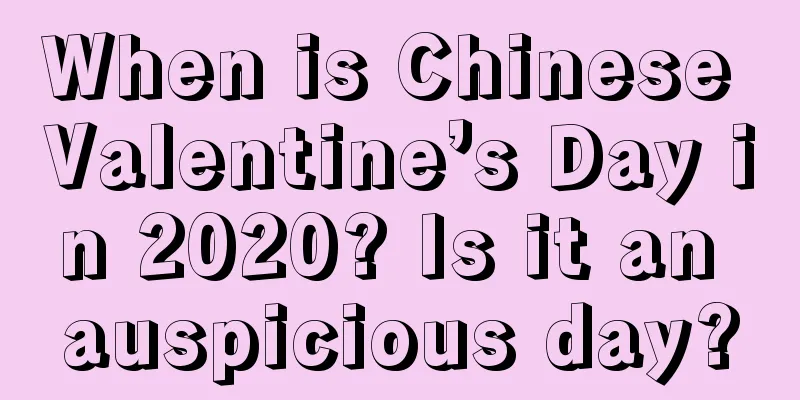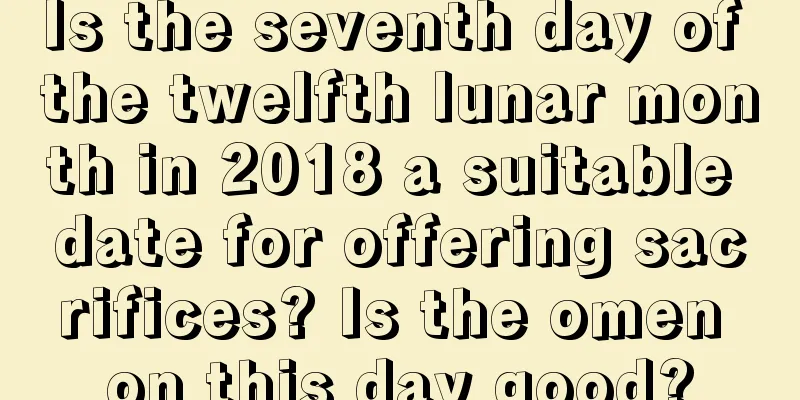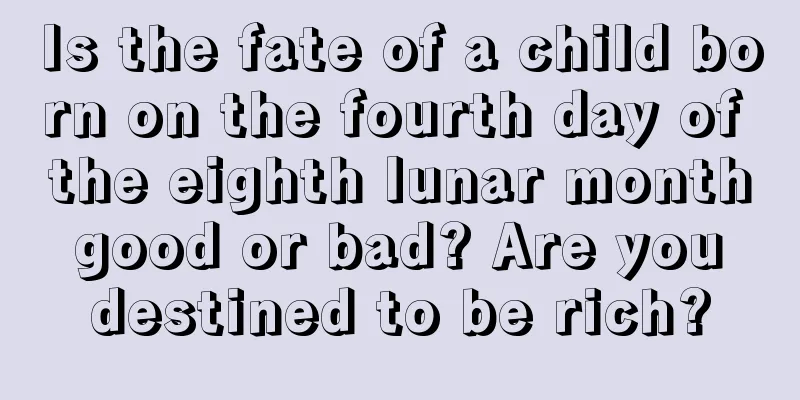When is Chinese Valentine’s Day in 2020? Is it an auspicious day?

The Chinese Valentine's Day is here again. At this time, few people manage their finances, but many people lose money. Sending flowers, gifts, treating people to dinner... everything costs money. Where did this "custom" start? When is Chinese Valentine’s Day in 2020? Is it an auspicious day? July has beautiful names such as Qiao Yue, Gua Yue, Orchid Autumn, Zhao Qiu, Xin Qiu, Shou Qiu, Xiang Yue, Meng Qiu and Chu Qiu. If you want to know more about the seventh month of the lunar calendar in 2020, please follow Mr. Shui Mo’s website!When is Chinese Valentine’s Day in 2020? Is it an auspicious day?According to the old almanac:The seventh day of the seventh month of the lunar year 2020 (lunar calendar) August 25, 2020, Tuesday, Virgo (solar calendar) 【Today’s lunar calendar is suitable】 Marriage, sacrifice, blessing, fasting, groundbreaking, moving, and housewarming [Today’s taboos in the almanac] Opening ceremony ——There are no more than 10 taboos on the 2020 Chinese Valentine's Day, and it is suitable for [marriage], so it is an auspicious day! How did the Qixi Festival become the “Spending Festival”?1. In ancient times, the Qixi Festival was free of charge and was a "women's labor skills competition festival"The Chinese Valentine's Day, also known as the Qiqiao Festival, the Seven Qiao Festival or the Birthday of the Seven Sisters, originated in the Han Dynasty. In the "Miscellaneous Notes of Western Capital" by Ge Hong of the Eastern Jin Dynasty, there is a record that "beautiful women of the Han Dynasty used to thread seven-hole needles in the Kaijin Tower on July 7th, and everyone was accustomed to it." This is the earliest ancient document about the Chinese Valentine's Day that we know of. The ancients attached great importance to the annual custom of begging for skills, and women would perform various begging for skills activities on the night of the seventh day of the seventh month. Douqiao is a competitive activity during the Chinese Valentine's Day. Women compete in threading needles, steaming clever buns, baking clever fruits, making clever sprout soup, and making decorations with dough modeling, paper cutting, and colorful embroidery. Whoever has good craftsmanship must be skillful. Among them, the most popular competition is needle threading: holding the colored thread in hand, thread the thread through the needle hole facing the light. If one can thread the thread through seven needle holes in one breath, he is considered to be skilled and is called a skillful hand. If he cannot thread the thread through seven needle holes, he is considered to be a loser. In later Tang and Song Dynasty poetry, women's begging for skills were repeatedly mentioned. Wang Jian of the Tang Dynasty wrote a poem saying "The dim stars are adorned with pearly light, and the palace maids are busy begging for skills on the Qixi Festival." According to "Kaiyuan Tianbao Yishi", Emperor Taizong of Tang and his concubines held banquets in the Qing Palace on the Qixi Festival every year, and the palace maids each begged for skills. This custom has been popular among the people and passed down from generation to generation. Later, the Qixi Festival was endowed with the legend of the Cowherd and the Weaver Girl and became a festival symbolizing love, thus becoming the "Couple Reunion Festival." It was not until recent years that Qixi Festival became an official "Valentine's Day" for unmarried lovers. 2. It was the Japanese who first turned "Valentine's Day" into a "consumption festival" Western Valentine's Day was introduced to Japan in 1936. At that time, Valentine's Day was a popular day in Europe to confess one's love to one's loved one. In Kobe, there is a chocolate manufacturer called Morozov that first introduced this custom to Japan and recommended chocolate as a gift for expressing love. However, it is said that only 3 pieces of Valentine's Day chocolate were sold on the first Valentine's Day. Later, in 1958, the sales director of another chocolate manufacturer, Mary Chocolate, took advantage of this topic and held a promotional event at the Isetan Department Store in Shinjuku, Tokyo, where women gave chocolates to men on Valentine's Day. They encourage women to confess their feelings to the men they secretly love on this day. At that time, confessions were still mainly initiated by men, but this time the promotion used a very clever method, which was to announce that this day was not only a day for expressing love, but also a day for women to take the initiative to confess their love. As a result, Japan's Valentine's Day has created business opportunities as a day for women to express their feelings. On February 14th, women will definitely give gifts to men, and the gifts are mostly chocolates. Because women are embarrassed to express their feelings directly, they don’t give chocolates to one person, but buy several pieces of chocolate at the same time and give them to different men, one of whom is the one they like. This custom evolved into the so-called giri chocolate, which means giving chocolate as a favor to superiors, colleagues and various people who have helped you in the company. In the end, it became a thing that everyone in many companies had. Female colleagues must give chocolates to male colleagues. Otherwise you will become alienated from the masses. So will male colleagues have it easier? The answer is no, because in order to repay the favor of February 14th, the Japanese created March 14th - White Day. On this day, men have to return the chocolate they eat in the form of candies, biscuits, black tea, handkerchiefs, etc. The ones who are truly happy about Valentine's Day are the manufacturers. 3. How big are the business opportunities for China’s Qixi “Valentine’s Day”? The Chinese people's habit of spending lavishly on Valentine's Day, or in other words, the Chinese businesses' habit of using Valentine's Day to incite consumers to spend lavishly, is obviously learned from the West. Although the Qixi Festival has not been recognized as Valentine's Day for a long time, this does not hinder the determination of businesses to take advantage of it. When we click on various online shopping malls, "Qixi Festival Gifts" has been promoted to the recommended position on the homepage, and the sales of many products this week are over 10,000 pieces. In addition to chocolate shops, restaurants, cinemas, shopping malls, flower shops, etc., various "romantic economies" are booming, such as creating a love that travels across the starry sky, giving a unique customized confession artifact, and making a sand painting confession of our shared memories. One netizen complained: "On Qixi Festival, my monthly salary was gone." Romance is of course essential on Chinese Valentine's Day, but rational consumption is also important. It can not only avoid the embarrassing situation of having a "dry" wallet after Chinese Valentine's Day, but also "add gold" to love. Everyone can make a holiday budget in advance and have a clear idea of holiday expenses. Of course, there is a better option. You can earn holiday money through investment and financial management. Let money make money, every day is Valentine's Day, why not do it! |
<<: Is July 26, 2020 a good day to pray? What will the hexagram show on September 13?
Recommend
What is the lunar calendar for the eighth day of the twelfth lunar month of Laba Festival in 2021? Is it a good time to start work?
The twelfth month in the lunar calendar is the col...
How is Pisces' fortune during the New Year's Day in 2022?
Pisces' fortune is different in different peri...
Is April 20, 2019, the Grain Rain Day, a suitable day to pick up a car? Is it a good day to pick up a car on the Grain Rain Day?
Introduction: In our country’s traditional culture...
Query the auspicious and unlucky time of the 14th hour of September 2017, and the auspicious and unlucky time of the 14th hour
We have quietly stepped into a season full of har...
Is the eighth day of the sixth lunar month in 2020 a good date in the lunar calendar? What are the do's and don'ts?
The sixth month in the lunar calendar is the firs...
Is the sixth day of the eighth month of the Year of the Tiger in 2022 an auspicious day? Is it suitable for travel?
Is the sixth day of the eighth month of the Year o...
Is the 22nd day of the first lunar month in 2022 suitable for funerals? Is the hexagram a good omen?
The first month of the lunar calendar is the begin...
What is the best food to nourish the liver and extinguish fire during the Jingzhe solar term?
Jingzhe is the third solar term among the twenty-f...
Can we offer sacrifices to our ancestors on the 11th day of the 11th lunar month in 2018?
Sacrifice is an important part of our country'...
Is September 15th of the lunar calendar in 2021 an auspicious day? Can I move?
You need to choose a time to move, and not all tim...
What can’t you do during the Great Cold? What to do in the Great Cold
On extremely cold days like the Great Cold, if you...
Is it not a suitable day to set up the bed today, the fifth day of the fourth lunar month in the Year of the Rat 2020?
Introduction: According to the tradition of our co...
Is it okay to get engaged on Laba Festival, the day after New Year's Day in 2020? What are the taboos to pay attention to in engagement?
Introduction: Generally, you need to choose an aus...
Do girls born on September 22nd of the lunar calendar have good fortune? Naturally gifted?
Introduction: There are many factors that affect p...
How many days are there in the twelfth lunar month? Is the twelfth month of the lunar calendar the twelfth month?
What month is the twelfth month of the lunar calen...









